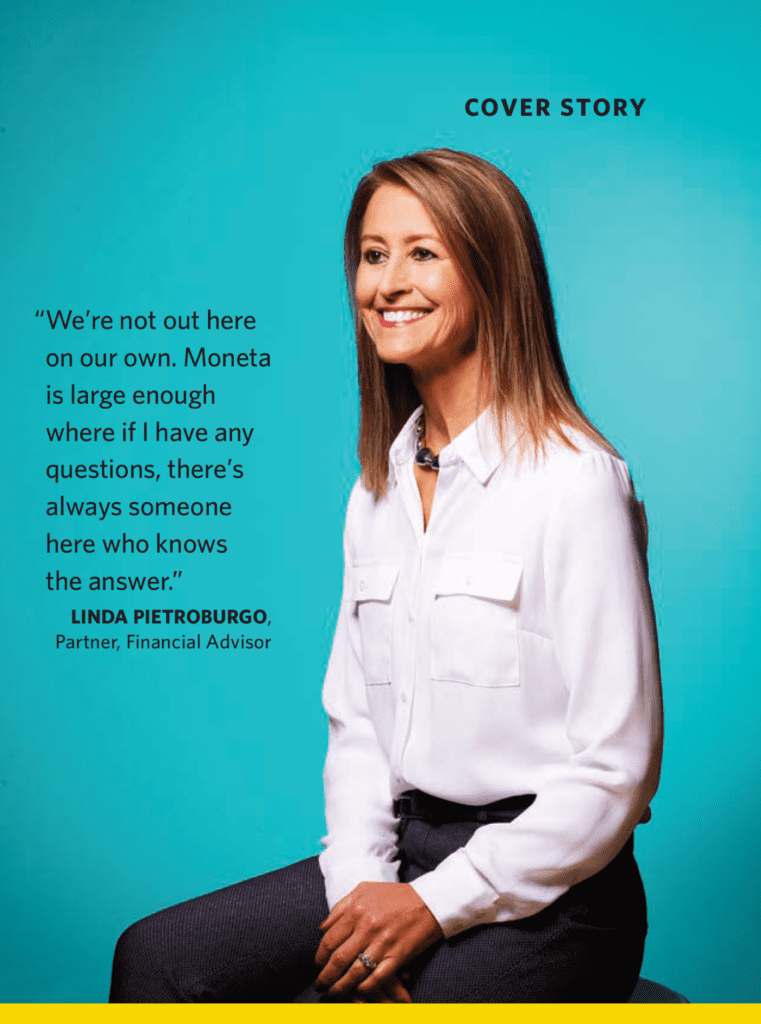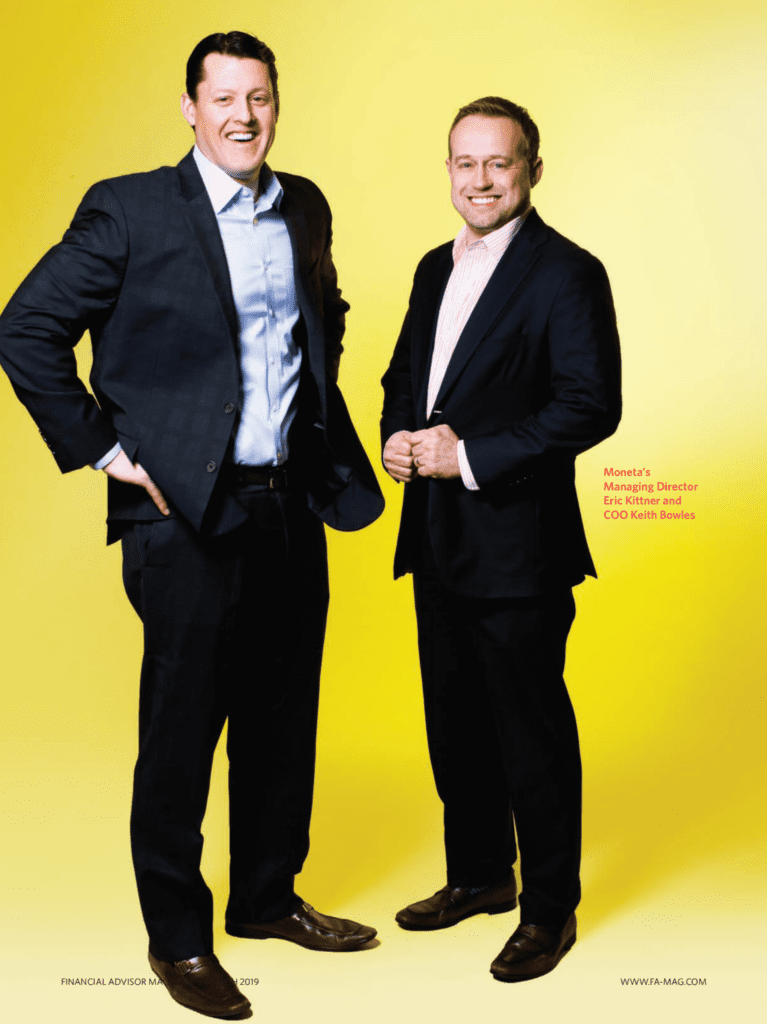National and local media publications keep turning their readers’ attention towards Moneta, communicating trust and respect in Moneta as a source, story and model for the rest of the financial planning industry.
Two weeks ago, InvestmentNews encouraged other firms to look to Moneta for inspiration. This week, City Wire, St. Louis Business Journal and Denver Business Journal (subscription required) all ran original stories about Moneta’s first-ever geographic expansion to Denver after 150 years of making the “Gateway to the West” our exclusive home.
The ultimate media highlight, however, was seeing Moneta featured as the cover story of this month’s Financial Advisor Magazine. Moneta did not pay for this full-length feature profile; FA Mag decided on their own initiative that Moneta’s story was worthy of their March cover, six pages of prime editorial real estate and countless hours of reporting time by their senior editor and art director.
Here is the full version for you to enjoy:

How do you maintain a small firm feel at a $20 billion RIA? Eric Kittner says the answer lies in advisors’ autonomy and entrepreneurship. Kittner, managing director of St. Louis-based Moneta, is charged with continuing the firm’s growth while making sure it doesn’t lose the culture that he credits for its success. Part of Kittner’s challenge is that Moneta has become a beast of an advisory firm in the St. Louis region with 300 employees and a large, diverse client base.
Moneta’s growth is unusual—it has made few acquisitions, and steers clear of investors from the private equity and large-firm universe, yet it doubled in AUM, number of clients, employees and revenue over the last decade.
“We grew by going back to our roots from our founding partners, recruiting talented, entrepreneurial individuals from other careers, and allowing them the independence to build a practice,” says Kittner.
Also unusual is the age of Moneta’s management—the average age of the firm’s board of managers is 49. Kittner himself is 40 years old. While 13% of the overall staff of the firm identify themselves as baby boomers, 29% call themselves Generation X and 58% millennials.
“We believe as an organization that we are uniquely qualified to train NextGen leaders, so it’s to our advantage to hire leaders at the start of their career,” Kittner says. “Our 30 years of institutional knowledge operating as an RIA with advisors all working directly with clients out of a single location is an anomaly. Our young leaders in training have access to that unique resource firsthand.”
Moneta has also started to emphasize gender diversity among its ranks—while only 6% of Moneta’s partners are women, 46% of its advisors identify as female and 57% of its overall staff.

About Moneta
In some ways, Moneta resembles a coalition of independent teams of advisors more than it looks like a typical mega-RIA. It is owned by a group of 37 equity partners operating on 22 teams of advisors, which the firm labels “client service teams.” All client service teams are committed to the fee-only RIA model, which Moneta adopted in 1989.
Despite the firm’s size, Moneta has yet to move beyond the St. Louis area. All its teams operate within the same building in St. Louis, while an enterprise service team of nearly 70 employees providing infrastructure and support operates in a second building nearby.
“Our partners’ teams look a little different from each other, particularly in terms of the clients that they serve,” says Kittner. “Some have more retirement plan business than others. Partners get to decide the makeup of their team structure and how it looks; they’re able to build their own businesses and design them the way they want.”
The dichotomies between large and small and between centralization and independence give Moneta a growth engine and identity unusual among RIAs.
The firm’s roots stretch back to the Home Life Insurance Company, an insurance broker founded in 1869, making 2019 Moneta’s 150th anniversary. The firm’s predecessors pioneered financial planning, first offered through a service called “planned estates” in 1933, when the firm adopted a philosophy of “problems to solve, not products to sell.” Throughout the Great Depression, as many investors lost money, Moneta’s predecessor was able to grow its assets.
In the 1980s, the firm was called First Financial Group of St. Louis, and it came under the leadership of longtime owner and managing director Peter Schick. Schick led the firm’s 1988 rebranding as the Moneta Group, when its structure as a coalition of financial planners took shape. In 1989, the firm became an RIA, a move driven by its desire to maintain objectivity and operate in the best interest of its clients.
Fifteen years ago, Schick still owned the entire firm. Around that time, he decided to sell the company to all of its partners to create a more sustainable business.
Last year, it rebranded again, and “The Moneta Group” became just “Moneta,” and embraced its identity as a “family CFO” for its wealth management clients, adopting the tagline “we simply go further.” Kittner says the rebrand aimed to recognize the diversity of the firm’s clientele and services.
“The rebrand was something we [did] to clearly identify who we are,” says Kittner. “One thing we wanted to articulate is that over the years we have started working with a variety of clients—our original family CFO clients, institutional clients or retirement plans, HENRYs (high earners but not rich yet), the emerging affluent. We wanted a rebrand so that the marketplace knew we were a firm with many solutions.”
Moneta now has three business lines: the wealth management family CFO service that is approximately 80% of the firm’s business; retirement plan consulting that is approximately 10% of its business; and a family office that is another 10% of its business.

Growth
Moneta has grown by allowing its client service teams to act as engines of organic growth. With little marketing and almost no acquisitions, client referrals and community involvement were the primary methods of attracting new business.
“At Moneta, the success of the individual teams comes from the fact that you behave differently when you own your own clients, and we feel like it helps to keep the entrepreneurial spirit alive,” says Patrick McGinnis, a partner with the firm. “I’ve heard that many large firms struggle to get advisors to feel the need to develop additional business. The growth is done through mergers and acquisitions versus organic growth. We’ve grown to $20 billion from partners owning their own teams.”
Moneta’s advisors are empowered to be their own decision makers and do not often have to look upward for permission to make changes in their practices.
Take, for example, the firm’s Pietroburgo Team. It was founded in 2011 when Linda Pietroburgo, now a team leader and Moneta partner, left a job in finance at the Washington University School of Medicine. Many of her original clients were physicians from the school, clients she still serves today.
“At that point in the firm’s history, we came in at zero,” says Pietroburgo. “You came in, you had an office that they charged you for, and you just started trying to build a business. It was a daunting task … back then, Moneta was a different company. We were more independent individually. There wasn’t a lot of crossover between our teams.”
Now, she has spun off much of her business to other partners and advisors so that she can develop a new service offering oriented around socially responsible investing. She is funding her own training, but will be able to offer her assistance to other Moneta advisors interested in offering socially responsible investing to their clients.
Moneta thrives because its 37 partners have developed their own interests and expertise just as Pietroburgo has.
Moving forward, Moneta’s management has recognized that its entrepreneurial, organic growth will need to be augmented with mergers and acquisitions and a more formal marketing effort as it begins to look beyond the St. Louis area. Hand-in-hand with the firm’s recent rebranding, Moneta updated its web presence with a more modern site, and is exploring additional marketing and advertising opportunities to ensure that it continues growing.

Structure
In preparation for continuing growth, Kittner and Keith Bowles, Moneta’s 44-year-old COO, have focused on shoring up the firm’s enterprise service team.
Moneta’s enterprise service team enables entrepreneurship by handling tasks like information technology, compliance, human resources and training, allowing advisors to dedicate more of their time to serving clients.
“We go further than back- and mid-office support; we do things like strategic planning,” says Bowles. “We also work on marketing strategies, recruitment, operations—we build a pipeline of talent. We inject ourselves into teams not just from a back-office perspective, but also thinking about how we can align the team with Moneta as a whole. Since they service 21 teams, they witness different ways to build a sustainable business. They can step in and help teams to think strategically, make the right hires, understand the client makeup, understand the revenue forecast, transition their business to the next partner—all of those things that they have to deal with as business owners.”
The client service teams have a small, intimate feel, says Kittner, yet some teams have assets and clientele that rival entire RIAs. For example, McGinnis’s team, the Kukla McGinnis Brown Team, is among the largest with three partners and four additional advisors managing $1.58 billion in assets for 514 clients.
The enterprise-client service team relationship Moneta uses resembles the structure of many large accounting firms, and many among the firm’s advisors and partners are alums of firms like Price Waterhouse. In the 1990s, Moneta created a new model for team development including a new position, the “professional consultant,” that would be populated by advisors with professional designations interested in client services but not new business development.
Moneta maintains that its structure and the professional consultant position were driven by a desire to further enhance its client service offerings and accommodate its continued growth, rather than a desire to mimic the success of accounting firms.
Having a number of diverse client service teams under one roof facilitates information and resource sharing. Because each team is able to develop its own niche, and there are nearly 40 partners and 60 other advisors in one building, expertise on almost any planning-related subject is available in-house.
“If we were to go somewhere else, we’d be a stand-alone company without the resources we get from being part of Moneta, and those resources are important for our growth,” says McGinnis.
David Sadler’s team, the Sadler Georgen Harmon Team, serves 274 clients managing $1 billion in assets. The team consists of three partners and four additional advisors, with nine additional support staff members.
While Sadler and his advisors are proficient at providing family CFO services, they fall back on the expertise of Moneta’s enterprise service team and other advisors within the firm to help serve institutional clients like defined contribution plans.
When a client service team generates revenue, a portion of it goes to Moneta as a whole, with the remainder going to the team to pay its expenses. Teams are expected to pay their own salaries, bonuses, benefits, rent and equipment costs. After that, the remaining revenue falls to the partners on the team.
The Pietroburgo Team manages $577 million for 147 clients and has one partner—Pietroburgo—and four additional advisors, with nine additional support staff members.
“We’re not out here on our own,” says Pietroburgo. “Moneta is large enough where if I have any questions, there’s always someone here who knows the answer. … We are that large, with that many tentacles out into the community. The partners here know everybody.”
Through Moneta, Pietroburgo can offer her family office clients some of the concierge services and private placements that ultra-high-net-worth clients often demand. Because it hires CPAs, JDs and other credentialed advisors, Moneta keeps its own stable of estate-planning and tax experts in house, and many of the teams serving family-office-level clients have attorneys and CPAs on board.
The enterprise service team helps each client service team think strategically about building what Moneta calls a “sustainable business,” which means having in place the recruiting, training and development necessary to create a workable succession plan for all of the firm’s teams and clients.
“We use the term ‘sustainable business,’” says Kittner. “A sustainable business is focused on not just taking care of the clients we have and making sure that they have a home, but also on that next generation of partners who are growing the business.”

Youth
Much of Moneta’s staff is young for the financial services industry as a whole, with 30- and 40-somethings populating partner and board positions. McGinnis, who is a partner and on the firm’s board, is 37 years old. He was hired out of the firm’s internship program, which he entered at age 20.
However, Moneta isn’t young for the sake of being young. The youth focus is part of an enterprise-wide focus on sustainability and a desire to instill and maintain the firm’s entrepreneurial culture and collaborative approach to serving clients. Around seven years ago, Moneta began appointing a younger “ad hoc” member to its board to make sure there was some youth representation in the firm’s leadership that developed into a larger concentration on developing and promoting young, successful advisors into positions of influence within the firm.
“That was important in starting to get the board to transition to the next generation,” says Pietroburgo. “Our more tenured partners recognized the value that a different, younger perspective brings to the table.”
Moneta’s leadership needed to be just as sustainable as its client service teams. Thus, many of the firm’s founders and elder partners stepped back to make room for leaders like Kittner.
Younger leaders are able to think about the firm’s future with a longer time horizon, says Sadler. “When you’re in your late 30s and early 40s, you’re able to look at things with a time horizon beyond that of some of our partners who are more tenured,” he explains. “It’s harder to make longer term decisions when you’re in a later stage in your career versus partners who want Moneta to be something beyond their team and where it is today.”
Yet Moneta also emphasizes experience among its partners and its c-suite—the firm’s board, partners and executives have an average tenure of 16 years, and only 16% of them identify as millennials. Moneta has at any given time a group of young advisors rising through the ranks to more senior positions, and another group of senior advisors preparing to reach partner status. Education at Moneta is continuous—as are the succession concerns. To offer advisors a career path and access to resources, Moneta developed a dedicated training and development system within its enterprise and client service teams called Moneta University. (See the sidebar.)
Succession
“Succession planning here is not a one-to-one handoff,” says McGinnis. “We want to build businesses that continue to grow so our clients are served and we can continue to serve more clients.”
With a focus on hiring young and developing competencies over time, Moneta’s teams have several options for developing their own succession plans. McGinnis started his tenure as an advisor on a team led by Peter Schick and Don Kukla. Schick, around age 60 at the time, was preparing to leave the business. McGinnis and other younger advisors on the team were brought into Schick’s client relationships to prepare for the transition.
“When it was time, it was something we had built over a period of years,” says McGinnis. “The client didn’t experience any sort of shock or abutment. It was a natural progression that they knew was coming.”
Today, almost all of Moneta’s clients have at least two advisors involved in their client relationships. McGinnis now has younger advisors on his team that he is mentoring and preparing for more senior roles—at age 37, he is considering his own succession plan.
“We’ve thought about how we continue the sustainability of our team,” says McGinnis. “We’re hiring a fifth advisor on our team. We also have client service managers with aspirations to continue to grow in their careers. We’re looking for people who want to take the same paths that we took.”
Sadler, now 51, found himself merging with another team to become part of the succession plan for another Moneta partner, Nancy Georgen. Since then, he has begun developing his own successors, including one, Kara Harmon, who has risen to the level of partner.
Pietroburgo found herself responsible for managerial duties on the largest team at Moneta, leaving her little time for her personal professional pursuits. The team had three partners, with two senior advisors prepared to ascend to partner positions themselves. Her solution was to split her team into three. “Teams can take things in their own directions and strike agreements between themselves for a succession plan,” says Pietroburgo.
Part of her client base was transitioned to the senior advisors who created their own team. She will split the revenue from those clients 50-50 with their new advisors over three years while helping with the transition.
The Next Chapter
While Kittner and Bowles are working to formalize and strengthen the offerings of Moneta’s enterprise service team, the firm is also looking to move beyond its St. Louis-area roots.
Moneta’s strategic plan calls for the firm to operate in two additional markets within the next five years.
“We’re currently looking at the Denver market,” says Kittner. “We decided to look at our client makeup and where they are geographically. About 30% of our revenue base comes from outside of the St. Louis market, but you can generally work your way back to how they’re connected to St. Louis. Some of it is family or referrals.”
Moneta may answer some of advisors’ most serious business and career challenges while allowing them to maintain their independence—a solution it will continue to perfect while it looks to expand.
“In 10 years, I see Moneta being a larger version of its current self,” says McGinnis. “I see more of the work done behind the scenes at the enterprise service team level, and less work being done at the team level. Teams are increasingly focused on face time and actively servicing our clients. Filling out our enterprise service team will allow our teams to be more interactive with our clients and less bogged down by administrative functions.”
See the story on Financial Advisor Magazine’s website here.
© 2019 Moneta Group Investment Advisors, LLC. All rights reserved. These materials were prepared for informational purposes only. You should consult with an appropriately credentialed professional before making any financial, investment, tax or legal decision. Past performance is not indicative of future returns. These materials do not take into consideration your personal circumstances, financial or otherwise.



